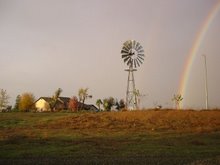Emergency Preparedness Part II
Sometimes when thinking about planning for emergencies or disasters I ask myself, "How much of this is prudence and how much of it is paranoia?" Different people will have different ideas of where the line is between the two and that can occasionally make discussions of disaster preparedness difficult.
In the two years before 2000 I heard many people talking about the Y2K bug with grave concern. I knew people who sold their home, move to the mountains and bought expensive solar paneled appliances for the eminent technological meltdown. I considered that paranoia, but they thought that people who didn't do that were in denial.
Here are what I consider the bare minimum preparations for emergencies for a prudent person:
Three days of water - one gallon per person per day.
Three days of food that can be eaten without cooking.
A manual can opener for said food.
Various sanitation supplies for bathroom, feminine, baby and cleaning needs.
Evacuation bags filled with clothes, diapers, light reading, first aid kit, etc.
A first aid kit separate from evacuation bags.
Flashlights and batteries.
Radio, either hand-crank or with extra batteries.
List of phone numbers of friends and relations and a designated out-of-state contact.
I know that some people would frown at the shortness of this list, but as I said this is the bare minimum. Most people don't even have this much ready. FEMA has its own list of essential items.
The Mormons are well known for being concerned about potential emergencies or disasters and many people think that they have crossed the line into paranoia. I have heard (but haven't varified) that Mormons have to have a least three months of food stored but are encouraged to have two years worth. Here is a blog post by a Mormon woman whose stake house had a mock disaster. It is humorous, but also is good food for thought.


1 comment:
Do you have to regularly cycle through the supplies so that you aren't stuck with 20 year old jugs of water and diapers that have yellowed with age?
I really approve of the light reading (and water if you're in a tornado area), but am skeptical of the rest, unless you live in the middle of a western forest or below sea level (and next to the sea). Most of the really useful things need to be used every day (and thus not packed) or else need to be fairly fresh to be usable—and most emergencies strike with a few hours' warning (one exception is a power failure, where you'll need candles, manually operated can openers, and if possible, a propane burner).
Post a Comment